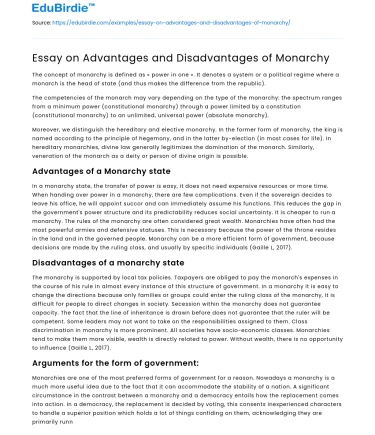The concept of monarchy is defined as « power in one ». It denotes a system or a political regime where a monarch is the head of state (and thus makes the difference from the republic).
The competencies of the monarch may vary depending on the type of the monarchy: the spectrum ranges from a minimum power (constitutional monarchy) through a power limited by a constitution (constitutional monarchy) to an unlimited, universal power (absolute monarchy).
Save your time!
We can take care of your essay
- Proper editing and formatting
- Free revision, title page, and bibliography
- Flexible prices and money-back guarantee
Moreover, we distinguish the hereditary and elective monarchy. In the former form of monarchy, the king is named according to the principle of hegemony, and in the latter by-election (in most cases for life). In hereditary monarchies, divine law generally legitimizes the domination of the monarch. Similarly, veneration of the monarch as a deity or person of divine origin is possible.
Advantages of a Monarchy state
In a monarchy state, the transfer of power is easy, it does not need expensive resources or more time. When handing over power in a monarchy, there are few complications. Even if the sovereign decides to leave his office, he will appoint succor and can immediately assume his functions. This reduces the gap in the government's power structure and its predictability reduces social uncertainty. It is cheaper to run a monarchy. The rules of the monarchy are often considered great wealth. Monarchies have often had the most powerful armies and defensive statuses. This is necessary because the power of the throne resides in the land and in the governed people. Monarchy can be a more efficient form of government, because decisions are made by the ruling class, and usually by specific individuals (Gaille L, 2017).
Disadvantages of a monarchy state
The monarchy is supported by local tax policies. Taxpayers are obliged to pay the monarch's expenses in the course of his rule in almost every instance of this structure of government. In a monarchy it is easy to change the directions because only families or groups could enter the ruling class of the monarchy, it is difficult for people to direct changes in society. Secession within the monarchy does not guarantee capacity. The fact that the line of inheritance is drawn before does not guarantee that the ruler will be competent. Some leaders may not want to take on the responsibilities assigned to them. Class discrimination in monarchy is more prominent. All societies have socio-economic classes. Monarchies tend to make them more visible, wealth is directly related to power. Without wealth, there is no opportunity to influence (Gaille L, 2017).
Arguments for the form of government:
Monarchies are one of the most preferred forms of government for a reason. Nowadays a monarchy is a much more useful idea due to the fact that it can accommodate the stability of a nation. A significant circumstance in the contrast between a monarchy and a democracy entails how the replacement comes into action. In a democracy, the replacement is decided by voting, this consents inexperienced characters to handle a superior position which holds a lot of things confiding on them, acknowledging they are primarily running the country. However, in a monarchy, the replacement is trained from birth to fulfill the position at their time. It is a more effective form of management, Because settlements go by the ruling state, and frequently through a particular individual. Rather than an extensive power and many red lines to operate to get regulations and laws established or advantages authorized, one declaration can be made that orders everything that requires to be prepared for the community. A monarchy often manages a more powerful defense. Monarchies ordinarily have the most powerful armies and defensive etiquettes. This is required because the authority of the throne ceases in the fields and forms being governed. Without lands and productive individuals, there is no government to form.
Arguments against:
Monarchies have been used as a form of government for many centuries which is why many people believe that they should be imposed because over time they have become old-fashioned and that we are in need of a more modern form of government. In our upcoming decade, we have a more efficient and modern way of living, therefore it is only fair to improve our form of government. It is challenging to adjust the course of a nation following a monarchy. Because just one family or one “noble” assembly is allowed within the ruling management, following the structure of a monarchy, it becomes more challenging for the characters to conduct a difference in whatever occurs in their community. Unless the leader or organization of directors grants, there is no way for the common person to produce change. Society has no opinion, which indicates a self-centered or power-hungry monarch could perform instant and long-term depression.
Monarchies are established by regional tax systems. Taxpayers are required to provide the values that a monarch acquires over the passage of ruling in essentially every situation of this government structure.
Conclusion:
In conclusion, I believe that monarchy is a strong and suitable form of government for a variety of countries. In a democracy, the replacement is decided by voting, this consents inexperienced characters to handle a superior position which holds a lot of things confiding on them, acknowledging they are primarily running the country. However, in a monarchy, the replacement is trained from birth to fulfill the position at their time. Therefore they would already. have the training and beforehand experience to properly rule a country






 Stuck on your essay?
Stuck on your essay?

